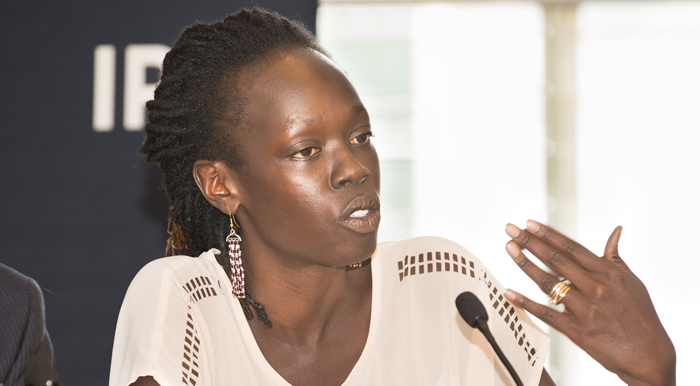
At a policy forum on May 12th entitled “The View from South Sudan: Civil Society Perspectives on a Way Forward,” two South Sudanese lawyers discussed the potential role of civil society in the mediation process, national reconciliation, and ensuring accountability for the abuses suffered by civilians in the current hostilities in their country.
South Sudan’s entry into the community of nations in 2011 as the 193rd UN member state led to celebration and widespread optimism about the country’s future. However, these hopes were dashed when a brutal civil war broke out last December following a power struggle between President Salva Kiir and his former vice president Riek Machar, resulting in thousands of deaths and more than a million people displaced.
David Deng, Secretary of the South Sudan civil society coalition known as Citizens for Peace and Justice (CPJ), and Anyieth D’Awol, a human rights lawyer and member of the CPJ Secretariat, expressed their despair at the recent events that have gripped their country.
“Everybody was planning on celebrating Christmas and having quiet time with their families,” said Ms. D’Awol. “Waking up at six in the morning and hearing the artillery, gunfire, and bombs. It was a real wake up call,” she said.
According to Ms. D’Awol, having open conversations is necessary to overcome the acute polarization and deep mistrust currently experienced by all sides of the conflict. While international actors have focused predominantly on strengthening the government of South Sudan, they have not done enough to support civil society and engage the local population. “Reconciliation will not trickle down,” said Ms. D’Awol. “The mistrust is too strong.”
“The only way to get real sustainable peace is to involve civil society in the process,” said Mr. Deng, “We need to begin engaging people to have open and frank discussions on the root causes of violence, elections, constitutional reform,” he said.
The panelists advocated for an approach to peacebuilding that should take into account the needs of a cross-section of South Sudanese society, including women, youth, tribal and religious groups, as well as a focus on economic development and strengthening communications among various groups. “There is a deep governance crisis … with the state failing to deliver public goods and services,” said Mr. Deng. “As a result, young people are vulnerable and have become drivers of the conflict.”
On May 9th, the government and opposition agreed to a tentative ceasefire, with a view towards establishing a transitional government and elections scheduled for 2017. However, Ms. D’Awol said that if a peace process is to have sustainable outcomes, then all actors must be clear-eyed about the current conditions in South Sudan. According to Ms. D’Awol, there had been a tendency since the 2011 independence to ignore or paper over the divisions among the South Sudanese people. International actors, including the UN Mission in South Sudan (UNMISS), must report openly and honestly on the human rights situation on the ground.
“We have to be completely and utterly honest,” she said. “It’s not possible to achieve what we want to achieve when the environment is not conducive.” While she expressed confidence in the most recent UN human rights report of May 8th, she said that earlier reports did not report completely on the extent of the human rights violations of the government.
Mr. Deng is also the research director of the South Sudan Law Society, a civil society organization dedicated to promoting the rule of law and respect for human rights in the country. He said that accountability mechanisms will be critical to ending the culture of impunity, which he called a “fundamental” driver of conflict. Civil society should be consulted in the establishment of a transitional justice system, he said. This will help to ensure that political leaders don’t grant themselves amnesty. According to Deng, a hybrid court that combines international capacity with local ownership is one possible way to build a culture of accountability and respect for human rights.
Ms. D’Awol, who had been a human rights officer with the former UN Mission in Sudan (UNMIS), added that women are “key” to ensuring the success of the peace process. Already, women have played an important role by attending the ceasefire negotiations in Addis Ababa. However, their continued involvement will be critical, she said. “Women are needed to break the cycle of violence. They look at the future and understand that violence is not a way forward,” she said. In 2009, Ms. D’Awol founded The ROOTS Project, a non-profit that provides a secure environment for women to pursue economic independence through traditional craftmaking.
Civil society is currently at an “all-time low,” according to Deng, who added that the space for civil society had contracted even before the conflict.
When it comes to supporting civil society, such as the ROOTS project, Ms. D’Awol added, stakeholders must act immediately. “The time is now,” she said. “It’s always been now.”
![]() Listen to the Global Observatory interview with David Deng and Anyieth D’Awol>>
Listen to the Global Observatory interview with David Deng and Anyieth D’Awol>>
Watch event:







